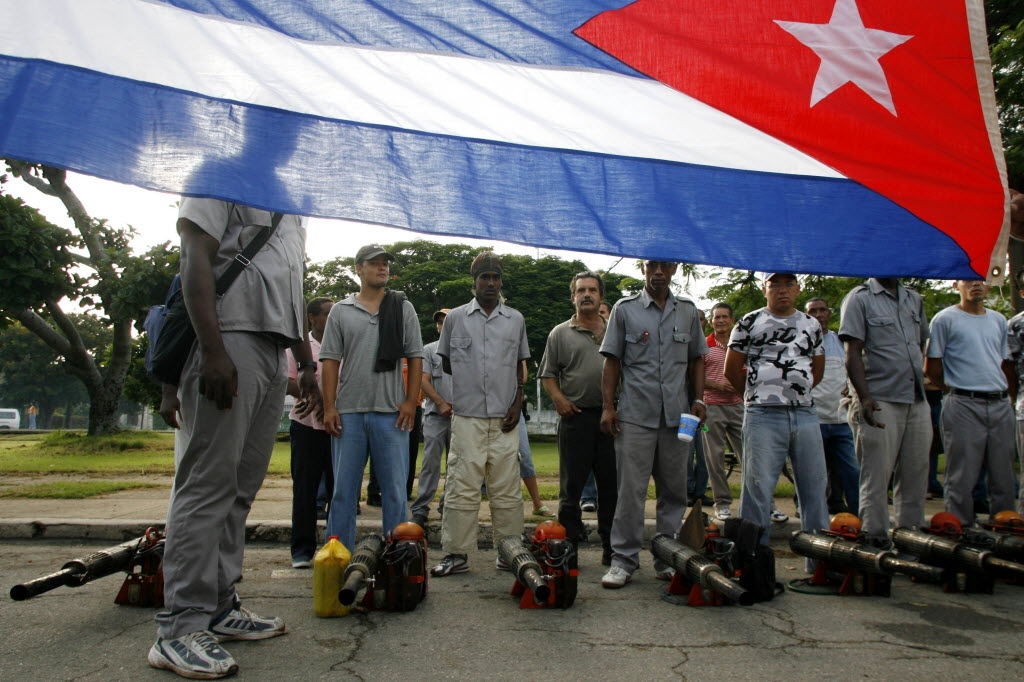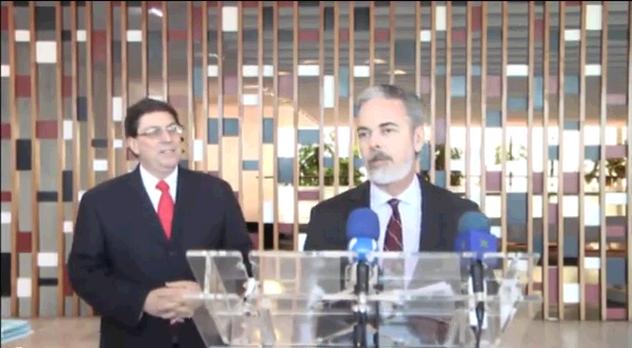There has been lots of noise about how to fix Brazil’s giant health deficit recently, but little clarity as to what, if anything, will be done. Above, the Cuban and Brazilian foreign ministers setting off the heated debate.
For the past week, Brazil has been having a somewhat puzzling discussion about its medical system. There has been talking of bringing in doctors from Cuba, or perhaps not, or perhaps from somewhere else, and lots of conflicting talk from separate parts of the government as to whether or not any of that is possible, or even desirable.
The only thing that seems to be clear at this point is that many parts of the country are severely underserved, especially compared to other parts of the country, and that there is currently no concrete plan to fix the problem.
Last week Brazil and Cuba’s foreign ministers announced a plan to send 6,000 Cuban doctors into far-flung parts of Brazil. Everyone understood that there are some parts of the country, notably the Amazon, where there are no doctors for miles. In the North of the country as a whole, there are less than 25% as many doctors per person as there are down here in São Paulo.
But the country’s Federal Medical Council (CFM) struck back harshly at the plan, calling it political, and saying that having no doctor is better than having a (presumably Cuban) doctor that is (presumably) under-qualified.
I wrote a quick web item for the LA Times on the argument, and Professor Greg Weeks rightly pointed out that there are a number of interesting strings to pull on in the story, namely that 1. economic inequality is still huge here, especially between regions, despite advances 2. the way Cuban doctors are deployed by their government for diplomatic purposes is endlessly interesting 3. that immigrant/aid labor has effects on local market price mechanisms, and will throw up winners and losers, and 4. That the CFM said some kind of shocking things, for example:
“Pseudo treatment is worse than no treatment,” [President Carlos Vital] said. “If you don’t have a doctor in your city, you can go to the next city and have a quality doctor.”
Sure, just go 100 miles to the next city if you don’t have a doctor. Nothing to see here!
This will sure look a lot like crass self-interest on the part of the local doctor’s lobby – who would likely see their wages lowered by Cuban doctors – to many observers. It’s one thing to insist on qualifications for arriving doctors, it’s another to tell sick people in rural communities to just hop on a boat for days.

Then, this week, the story got more complicated. Health Minister Alexandre Padilha said that importing doctors cannot be taboo and must be explored. But he avoided the Cuban doctor issue entirely and said the focus should be on doctors from Portugal and Spain.
At first glance this just seems like a preference for Western Europeans over Cubans (in Brazil’s history, preference for people from this part of the world can bring up tough memories). I’m sure there may be good reasons to prefer the Europeans over Cubans (Higher unemployment in Europe? They would stay here permanently?), but why not mention them?
As many experts have pointed out, unless incentive structures are changed and it becomes more attractive to serve far from the big cities, any new immigrants with full rights will likely just re-produce the same imbalance we currently have, with everyone huddling around São Paulo and Rio. What we see with our current education/salary schemes is a lot of upper-middle class kids gravitating towards specialist degrees and then clinics in the big cities, according to Telmo Ronzani, a specialist in public health at the Federal University of Juiz de Fora.
All of this raises two questions:
1. What is actually going to happen and who is in charge of this? The Foreign Ministry, the CFM, or the Health Ministry? Do they really not talk to each other except through polemical statements to the press?
2. If can they get together to bring in a temporary solution, as it looks like they might, will there be a political movement to push Brazilian doctors into the countryside? It shouldn’t cost much. and the many sick without doctors are one of the gaping holes in Brazil’s success story.


